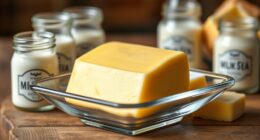Yes, it's okay to eat butter, especially in moderation. One tablespoon offers essential vitamins and beneficial compounds like butyrate. While some worry about saturated fats, recent studies suggest they might not greatly increase heart disease risk. In fact, moderate consumption of butter can fit well within a balanced diet and may even support digestive health. Plus, butter enhances the flavor of many dishes, making it a kitchen staple. So, if you're curious about how to include it in your meals for maximum benefit, there's more to explore about butter's role in a healthy diet.
Key Takeaways
- Moderate butter consumption (1-3 tablespoons) can fit within dietary guidelines and may provide health benefits.
- Saturated fat in butter is not significantly linked to increased cardiovascular disease risk, according to recent studies.
- Butter provides essential vitamins A, D, E, and K, supporting vision and immune function.
- Butyrate in butter promotes digestive health and exhibits anti-inflammatory properties.
- Grass-fed and organic butter options offer additional health benefits, including omega-3 fatty acids.
Understanding Butter's Nutritional Profile

When you think about butter, it's easy to focus on its rich taste, but understanding its nutritional profile is key to making informed dietary choices. One tablespoon of butter packs 102 calories and 11.5 grams of total fat, making it a calorie-dense option. Butter's fat content typically ranges from 80% to 82%, which contributes to its solid structure at room temperature. Additionally, different types of butter, such as salted and unsalted, can impact overall flavor and usage in various recipes.
Despite its high saturated fat content—approximately 63%—butter also offers health benefits. It's a good source of Vitamin A, providing 11% of the Reference Daily Intake (RDI), along with smaller amounts of other vitamins and minerals like Vitamin E and calcium. Consuming butter in moderation can also provide essential fatty acids that are vital for overall health and well-being. Furthermore, using a butter infuser can enhance the flavors and health benefits of butter by incorporating various herbs.
Butter contains beneficial compounds such as butyrate, which supports digestive health and has anti-inflammatory properties, and Conjugated Linoleic Acid (CLA), linked to potential anticancer properties. Additionally, butter is a source of healthy fatty acids, which can be beneficial for overall health.
While dietary guidelines suggest limiting saturated fat to under 10% of daily calories, which comes to around 22 grams for a 2,000-calorie diet, enjoying 1–2 tablespoons of butter daily in moderation can fit within those limits.
Recent studies indicate no direct correlation between saturated fat intake and cardiovascular risk, challenging older beliefs. By understanding butter's nutritional profile, you can enjoy its flavor while balancing your overall health.
The Truth About Saturated Fats

Understanding saturated fats can be a game changer for your dietary choices. Recent studies, including a 2010 meta-analysis, challenge the long-held belief that saturated fat intake greatly increases health risks, especially regarding cardiovascular disease.
In fact, about 63% of the fat in butter is saturated fat, yet experts now suggest that moderate consumption may not be as harmful as once thought.
With over 80 studies involving more than half a million subjects indicating potential health benefits from saturated fat, it's time to reassess dietary guidelines. Current recommendations advise limiting saturated fat to less than 10% of daily calories—approximately 22 grams for a 2,000-calorie diet—which allows for 1 to 3 tablespoons of butter each day in moderation.
Emerging evidence suggests that when consumed as part of a balanced diet, saturated fats might even help reduce obesity and lower cholesterol levels, potentially mitigating diabetes and heart issues.
Health Benefits of Moderate Butter Consumption

Butter, often viewed as a culinary indulgence, offers several health benefits when consumed in moderation. When you add butter to your meals, you're not just enhancing flavor; you're also incorporating essential vitamins A, D, E, and K, which support vision, bone health, and immune function.
One tablespoon of butter packs about 102 calories and 11.5 grams of total fat, making it calorie-dense, yet a valuable addition to a balanced diet.
Recent research suggests that moderate butter consumption—about 1-2 tablespoons daily—may actually reduce obesity risk, diabetes, and heart problems, especially when balanced with healthy foods.
Curiously, while butter contains about 63% saturated fat, studies show that this isn't notably linked to increased cardiovascular disease risk in moderation.
Moreover, the butyrate found in butter contributes to digestive health and has anti-inflammatory properties, promoting overall well-being.
Culinary Uses and Versatility of Butter

Elevate your culinary creations with the rich flavor and versatility that butter brings to the table. This staple ingredient is essential in various cuisines, especially French cooking, where it enhances both taste and texture. Additionally, using air purifiers in your kitchen can help maintain a clean cooking environment, free from unwanted odors that may affect the flavor of your dishes.
When it comes to baking, butter is a game-changer. It contributes to the moisture and buttery flavor that make cookies, cakes, and pastries simply irresistible, and using European butter can further enhance the richness of your baked goods. In fact, the use of grass-fed butter can also provide additional health benefits, including omega-3 fatty acids. Furthermore, incorporating nutrient-rich ingredients like celery juice in your diet can support overall health during pregnancy.
In savory dishes, you'll find butter working its magic in sauces. Its creamy consistency elevates your meals, providing a luxurious mouthfeel that complements a wide range of ingredients, including herbs and spices. You can effortlessly transform a simple dish into something extraordinary with just a spoonful of butter.
Moreover, butter's culinary applications are expanding. As you embrace it in your cooking, you'll discover how it can balance flavors beautifully when used in moderation. Additionally, the growing demand for organic and artisanal butter products reflects consumers' desire for higher quality ingredients.
Whether you're sautéing vegetables or whipping up a rich sauce, butter's versatility makes it an indispensable ally in the kitchen. So, go ahead—experiment with butter in your recipes and enjoy the delightful texture and flavor it imparts. Your dishes will thank you!
Recent Research and Shifting Perspectives

The culinary world isn't just evolving regarding flavors and techniques; it's also adapting to new nutritional insights about ingredients like butter.
Recent research has shifted perspectives on saturated fat, particularly in butter. A 2010 meta-analysis involving over half a million subjects found no significant link between saturated fat and cardiovascular disease. This finding was bolstered by studies published in 2014, prompting a reassessment of dietary guidelines concerning saturated fats.
Experts now advocate for moderate consumption of butter—typically 1–2 tablespoons daily—as part of a healthy diet, without increasing health risks.
This change reflects a broader understanding of dietary fats, highlighting that not all saturated fats exert the same effects on health. Current recommendations emphasize a balanced intake of fats, encouraging you to integrate butter with healthier options like olive oil and avocados for maximum health benefits.
Frequently Asked Questions
What Do Cardiologists Say About Butter?
Cardiologists suggest that butter can fit into a balanced diet when consumed in moderation.
They emphasize that recent studies show no significant link between saturated fat from butter and heart disease risk. You can enjoy 1–2 tablespoons daily, especially when paired with healthier fats like olive oil and avocados.
Just remember, moderation is key. By keeping your saturated fat intake under 10% of daily calories, you can savor butter without negative health impacts.
How Can You Tell if Butter Is Safe to Eat?
Think of butter as a delicate flower; it needs care to thrive.
To tell if your butter's safe to eat, check for any off or rancid smells. Look for discoloration or changes in texture, which signal spoilage. If you spot mold, toss it out—mold can dig deeper than you see.
What Is the Truth About Butter?
The truth about butter lies in understanding its nutritional profile and how it fits into your diet.
While it's high in saturated fat, recent research shows that moderate consumption—about 1–2 tablespoons daily—can be beneficial.
Butter contains compounds like butyrate, supporting digestive health, and CLA, which may offer health benefits.
Is I Can't Believe It's Not Butter Bad for Your Cholesterol?
When you ask if "I Can't Believe It's Not Butter" is bad for your cholesterol, you should pay attention to its ingredients.
Many varieties contain trans fats, which can increase your LDL (bad cholesterol) and lower your HDL (good cholesterol).
These unhealthy fats may counteract any benefits you'd get from replacing saturated fats.
Always check the label for trans fats, and consider using natural options in moderation for better heart health.
Conclusion
So, it turns out butter isn't the villain it's made out to be. You might've thought spreading it on your toast was a one-way ticket to heart disease, but experts suggest moderation can actually be part of a healthy diet. Who knew that a simple pat of butter could spark such debate? Next time you're savoring that rich flavor, remember: sometimes the 'bad' things in life are just misunderstood. Enjoy that buttery goodness guilt-free!










